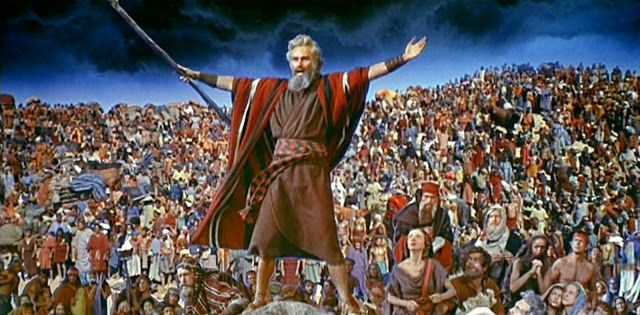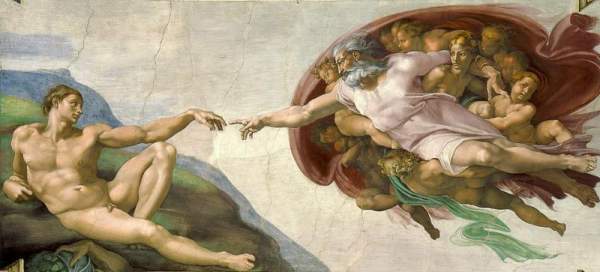The 2 major sources for the Christian faith are tradition and Scripture, as interpreted and proclaimed by the Magisterium, the teaching authority of the Catholic Church. Scripture, The Bible, needs an interpretive authority, and it only makes sense that it be the same authority that assemble it in the 1st place. The Catholic Church, which is spared no effort or expense in preserving the written word of God through the ages, is indeed the Bible's home.
However, the Christian life was never intended to be the mere study of writings that supposedly negated the need for good works, but instead the living out of the good news. This means a prayerful, repentant, sacramental, and grace-filled life, made possible by ordained ministers. Spoken words and works were far more common than written words for the passing on the faith.
In accordance with that belief, Pope Benedict said of saints(1) and art, representations of both of the above, are both continuations of the incarnation, visible and audible manifestations of invisible and inaudible realities. Both proclaim the good news in a clear manner and usually require far less study than Scripture, which can be obscure at times. An obscurity demonstrated by countless opposing Protestant commentaries on the bible, despite their claims about the perspicacity of Scripture.
History establishes that Jesus founded the Catholic Church. 1,500 years later Martin Luther founded Protestantism and the Lutheran church.
Luther’s scrupulosity, which caused him to see sin where it did not exist, was the genesis of his new religion and the root of its primary doctrine. Luther felt so incapable of doing good works that he denied their obligatory nature. In his mind, the notion arose that he could get to heaven without actually doing good things - and despite doing many evil things. Using Luther’s own standards, this of course blatantly runs counter not only to James 2: 24 but also to Romans 2:6 and Matthew 7:21.
Luther, however, decided to take his own route, isolated from the authority of the Church, to massage his troubled conscience. In the process, he apparently moved from here scrupulosity to full blown borderline personality disorder. Scrupulosity quietly internalizes a guilt while BPD loudly externalizes it. Luther, history tells us, became vulgar, angry, demanding, and accusatory.
Luther was animated to slay what he mistakenly called “the whore”, reason, “which is the fountain and headspring of all mischiefs.” Consequently the anti-rationalism of Lutheran theology was combined also in Luther’s mind with an anti-institutional spirit in both the religious and political realms, with the result that he made the Christian ethic appear irrelevant to the logic of the political order and hence damaging the possibility of orderly justice and freedom in the secular sense.
1. The 20th century saints taught the Christian faith so strikingly, not because they were biblical scholars or publishers, but because they lived out what they professed.
Supplemental Info:
https://www.americanthinker.co....m/blog/2025/06/logic


It is an irony of our checks and balances that an elected president, with majorities in both branches of Congress, still does not govern without compromise with hundreds of representative and senators. Trump’s task is further complicated because for the 1st time in the US he is also the daily target of a systemic attack by legions of cherry-picked, lower-court, neo-liberal federal district judges, who find their 5-minutes of left-wing fame, by issuing non-democratic fiats for all 340 million Americans everywhere.
If left-wing/democrats win back the House, they will go after both Musk and Trump with endless subpoenas and nihilist Mueller-like investigations.
Tesla started bleeding because of a systematic leftwing effort to terrorize Tesla drivers, dealerships, and charging stations, and a left-wing media-backed PR campaign to demonize the brand—all because Musk had aligned himself with Trump. Musk, knows that Trump treated him fairly and gave him more latitude than any private presidential advisor since the friendship between Harry Hopkins (who moved into the White House) and FDR.
Hopefully a public truce—followed by intermediaries restoring the friendship but spelling out the limitations and constraints on each that will result in a new less volatile, less intense, but more sustainable and mutually beneficial relationship.
Trump is now engaged in high-stakes diplomacy with some of the toughest, slyest, and meanest leaders in the world with xi jinping, putin, and the Iranian lunatic theocrats. He cannot afford to reach out to Musk and thereby appear to his enemies that he backs down. But if Musk reaches out and wishes to look ahead and not nurse wounds, Trump can certainly be magnanimous and to his credit state that he holds no grudges for what was said in the heat of passion, as he too looks forward to where and when he can help and be helped by Musk in the many areas where their aims are similar.
The sane tech crowd, and most of the MAGA base want an end to this aberrant Trump-Musk eruption. Over half the country concurs. Do not be fooled that the suicidal impulses of neo-liberals/democrats have neutered them. We are witnessing an unprecedented, unhinged left-wing/democrat effort to use lawfare, wealthy neo-liberal/dem donors, street theater, congressional disruptions, potty-mouth videos, the deep state, the left-wing media, and discredited pollsters to stop the sensible Trump agenda and instead destroy America. It will only intensify as the midterms near. Look for escalated left-wing/democrat attacks of all of us.
Unity is needed now—and quickly.
Supplemental Info:
https://www.americanthinker.co....m/articles/2025/06/t
Trump’s blowup with Musk stems from a dispute over the fiscal impact of the mammoth tax-and-spending package, dubbed the “big, beautiful bill.” Musk and others have said the House-passed bill would worsen the federal government’s fiscal health. The White House has rebutted these claims, noting that the reconciliation package is not a budget bill or a blueprint for balancing the budget. Instead, it is a procedural tool designed to advance as much of the president’s agenda through Congress as possible, based on the Republican votes currently available, and it excludes projected revenue from tariffs and economic growth tied to tax cuts, according to Trump’s top budget official Russ Vought. Still, various organizations estimate that this legislation will exacerbate federal deficits and contribute to the national debt over the next decade. Let's look at the different projections through the 2025–2034.
The Congressional Budget Office (CBO), a nonpartisan budget watchdog, released its scoring on the House-approved package. In its report, the CBO projected that outlays would decline by more than $1.25 trillion, but revenues would fall nearly $3.7 trillion. This will result in a $2.4 trillion increase in federal deficits over the next decade. White House Deputy Chief of Staff Stephen Miller disputed the CBO’s projection that the bill increases the deficit. “This lie is based on a CBO accounting gimmick,” he said. “Income tax rates from the 2017 tax cut are set to expire in September. They were always planned to be permanent. CBO says maintaining ‘current’ rates adds to the deficit, but by definition, leaving these income tax rates unchanged cannot add one penny to the deficit.” “CBO continues to use a baseline that is fundamentally skewed toward the way the real world is,” Vought said. “They assume that all spending will continue into eternity, but somehow tax relief that has an expiration date isn’t assumed for the entirety of the fiscal window.” Treasury Secretary Scott Bessent also alluded to the CBO’s recent tariff projections. This week, the CBO projected that tariff revenues will slash deficits by $2.8 trillion over 10 years, which Bessent said “puts the bill in surplus if you include the tariff revenue, which they won’t do.”
The Tax Foundation estimated that the bill would result in a $2.6 trillion increase in the deficit. “Overall, the bill would prevent tax increases on 62% of taxpayers that would occur if the TCJA expired as scheduled,” Tax Foundation said. The University of Pennsylvania’s Penn Wharton Budget Model forecast that the reconciliation bill would raise deficits by $2.8 trillion. According to Yale’s Budget Lab, over 30-years, the bill would add $10.8 trillion to the national debt. “If the tax provisions become permanent, with no additional tariff revenue, the debt-to-GDP ratio would hit approximately 191% in 2055. The only countries that currently have a higher debt-to-GDP ratio are Japan and Sudan,” the Budget Lab said.
Once the bill is enacted, the White House states that their actions, whether increased tariff revenues or substantial spending cuts, will reduce deficits by “at least $6.6 trillion over the next decade.” Supporters argue that the tax-and-spending plan, which includes tax cuts, would increase government revenues through more vigorous economic activity. This concept is related to the famous Laffer Curve. According to the Laffer Curve, popularized in the 1970s, there is an optimal tax rate that maximizes revenue, highlighting the relationship between tax rates and tax receipts. Following the passage of the 2017 Tax Cuts and Jobs Act, actual revenue from 2018 to 2024 totaled approximately $28.5 trillion. This has been $1.5 trillion higher than CBO’s projections—before adjusting for inflation.
In a CBO report officials predict that the One Big Beautiful Bill Act would trigger additional debt-servicing costs of $551 billion over the 10-year period. “That change would increase the cumulative effect on the deficit to $3 trillion,” the report stated. The Committee for a Responsible Federal Budget, an independent policy organization, estimate that interest costs on the new debt from the bill will amount to $1.8 trillion, accounting for 4.2% of GDP.
If interest rates remain elevated—the benchmark 10-year Treasury yield hovers around 4.5%—interest payments could surge to $2.1 trillion in 2034, representing more than 5% of GDP. “All else being equal, higher debt and deficit levels will raise interest rates,” the Yale Budget Lab said.
CONTINUED...
Supplemental Info:
https://patriotpost.us/article....s/117894?mailing_id=
Much of the warming measured at the Earth’s surface over the past 125 years stems from temperature measurements from locations with growing urban populations resulting in the “urban heat island” effect biasing the recorded temperatures, a study by a top-flight team of scientists from the Earth System Science Center (ESSC) at the University of Alabama recently published in the American Meteorological Society’s peer-reviewed Journal of Applied Meteorology and Climatology concludes. The study links increasing population density around and near surface station locations with quickly rising temperatures that bias the average temperature measure as a whole. Various official weather recording and reporting agencies in countries around the world have manipulated, adjusted, or “homogenized” surface temperature measurements, supposedly to correct for errors introduced by the technologies. Oddly, these “homogenization” efforts seemingly go in only 1 direction, with past temperatures adjusted downward and present temperatures adjusted upward. That makes the record show a steep warming trend, a steeper trend than has actually been recorded and which plays right into claims that humans are causing a dangerous global warming.
In 2015 researchers at the National Oceanic and Atmospheric Administration (NOAA) blended contaminated ocean temperature data from ships with relatively pristine data recorded by the Argo network of 3,600 floats distributed almost uniformly across the global oceans to provide temperature and salinity profiles from the surface to a depth of 2,000m, reporting an alarming increase in the rate of ocean temperature rise—supposedly refuting an observed long-term pause in rising temperatures. The shenanigans with ocean temperature data were revealed by the award-winning scientist involved in actually ensuring data quality for the agency. Then, in 2019, scientists were forced to admit a mathematical error that undermined claims of fast-rising ocean temperatures. The scientists’ extraordinary claims had slipped right through the peer-review process at the journal Nature.
Surface stations across the US are woefully compromised by the urban heat island effect, the phenomenon where urban areas experience higher temperatures, especially at night, than surrounding rural areas, due to the replacement of natural surfaces with heat-absorbing materials such as concrete and asphalt, and being located near artificial sources of heat such as furnaces, air conditioning units, outdoor grills, and areas of high automobile and/or air traffic. 96% of US temperature stations used to measure temperatures failed to meet NOAA’s and the NWS’s standards for “acceptable” and uncorrupted placement. UHI-biased stations skew the reported average temperature and temperature trends upward. In fact, 30% of the stations sampled were “ghost” stations, locations where no station currently exists, with the reported temperatures being completely made up by the agencies, extrapolated from temperatures recorded at nearby stations.
The method quantifies the sensitivity of Global Historical Climatology Network (GHCN) station raw temperature to station-centered population density (PD). Specifically, closely spaced station pair differences in monthly raw (non-homogenized) TAVG (the average of daily maximum and minimum temperature) and PD are sorted by station pair average PD into six PD classes, and linear regression estimates of the temperature sensitivity to population density change … are made for each class for historical periods ranging from 1 to 21 years in length. Every one of the resulting six sensitivity relationships in each of 22 historical periods from 1880 to 2020 are found to be positive, and their magnitudes allow construction of station-average urban heat island temperature (TUHI) curves as a function of population density.
The reported temperatures for most of the globe come from surface stations. By any measure, these stations and the temperatures they record are compromised by a variety of factors, including UHI introduced by poor siting and/or population density, homogenization changes that lack transparency, and the fact that some “reported data” comes from stations that simply don’t exist or that have been moved, meaning the data or its continuous trend has simply been made up. That’s certainly not how sound science should be undertaken or reported. Far-reaching, liberty-constraining, economy-impacting public policies should not be based on such a flawed foundation. That’s not sound public policy, especially as climate policies’ champions proclaim themselves to speak for “the science” and demand policymakers follow not the physical science but instead “the political science,” with no questioning or dissent allowed.
CONTINUED...
Supplemental Info:
https://brownstone.org/article....s/smell-the-roses-po
"American conservatism is skeptical of utopias, wary of unintended consequences, and unafraid to call things by their proper names...I believe that Trump is on the threshold of saving America. That is, I believe that his diagnosis of America’s problems is accurate. High on the list of those problems are a paralysing commitment to woke ideology, mass migration, stupefying debt, and cratering cultural self-confidence.”--Roger Kimball
“Conserving the ship of state means one thing in calm seas and quite another when a storm threatens to sink the ship, one thing when there is not another ship in sight and quite another when it is surrounded and being bombarded by enemy ships. Drastic action will be required of the captain and the crew to save, to conserve, the ship when it is on the verge of sinking or of being sunk. Trump understands that he is the captain of the ship when it is in danger of being lost. The rigged election in 2020, the fact that the neo-liberals/democrats got away with putting a senile nincompoop in the White House and keeping him there, and their confidence that they could replace him with a non-senile nincompoop raised alarm in every patriot heart. It is clear that if Trump does not manage to save the ship, in all likelihood, America will never have another free and fair election. He is trying to save America from one-party rule by the left-wing/democrats. We already have all the information we need to understand what that would mean for America, for American liberty, and for the forces for good around the world that depend on America for a chance to survive. You only need to consider what one-party rule by the neo-libs/democrats has done to California — and how quickly it was done. Guided by common sense and a sure grasp of the extent of the danger America is in, Trump is attempting to restore America to its former greatness in the midst of a great national emergency. To criticize the captain because he is not conducting himself as if he were sailing in fair weather and open seas, and to do so while calling oneself a conservative, is quite simply deranged."--Robert Curry
Supplemental Info:
https://freebeacon.com/democra....ts/dem-heavyweights-



